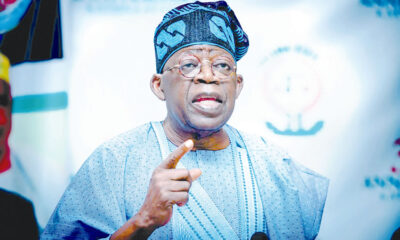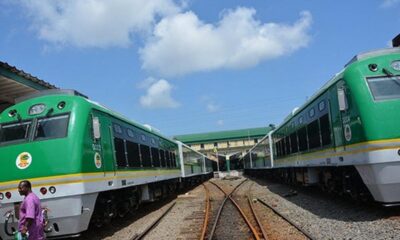Breaking News
UN, NBS: In 2023, Nigerian public officials received bribes totaling ₦721 billion.
According to a recently published research by the Nigerian Bureau of Statistics (NBS) and the United Nations Office on Drugs and Crimes (UNODC), bribes to Nigerian public officials in 2023 totaled not less than ₦721 billion.
The UNODC survey served as the basis for the outcome.
The NBS released a report titled “Corruption in Nigeria: Patterns and Trends” on Thursday. It states that the ₦721 billion in bribes paid represented around 0.35 percent of Nigeria’s GDP.
The average cash bribe, as reported by the poll, was ₦8,284, up from ₦5,754 on average in 2019.
The average monetary bribe paid, according to the 2023 poll, was 8,284 Nigerian Naira. Despite an increase from NGN 5,754 in 2019, the nominal average cash bribe size does not take inflation into consideration. What might have been purchased with the average cash bribe in 2023 (adjusted for inflation) was 29% less than it was in 2019.
According to the research, in 2023, bribes in cash totaling approximately NGN 721 billion (US$1.26 billion) were paid to public officials in Nigeria. This amounts to 0.35 percent of the country’s total GDP.
According to the research, the percentage of Nigerians who engaged with a public official in 2023 dropped from 63% in 2019.
Notwithstanding this decline, bribery is still pervasive in the country, with an average of 5.1 bribes paid for every bribe payer, or around 87 million bribes. Compared to the expected 117 million bribes in 2019, this is a drop.
Regarding mode of payment, the research stated that in 2023, more than 95% of bribes were made using money transfers or cash.
It stated that while private sector players, such as doctors in private hospitals, climbed from 6% in 2019 to 14% in 2023, public officials were more likely to demand bribes.
The public sector continues to have almost twice as much bribery as the private sector, and public sector contact rates are also twice as high.
Of Nigerians who dealt with governmental officials in 2023, 27% paid a bribe, a marginal decline from 29% in 2019. Bribery was engaged in more than one-third of encounters between civilians and public officials, including situations in which bribes were offered but rejected.
The survey also reveals a rising trend of Nigerians declining to accept bribes. Seventy-one percent of individuals solicited to pay a bribe in 2023 declined at least once, with the North-West zone having the greatest percentage of refusals at seventy-six percent. Refusal rates more than 60% were seen in every location. This suggests that more Nigerians are speaking out against corruption.
The report claims that Nigeria is becoming a less accepting place for bribes. The proportion of citizens who think that calls for bribes to speed up administrative processes are appropriate fell from 29% in 2019 to 23% in 2023.
In comparison to 2019, fewer individuals reported experiencing unfavorable outcomes as a result of declining bribery requests in 2023. This shows that Nigerians are becoming more empowered to challenge dishonest officials without worrying about the consequences.
Twenty-one percent of those who declined bribes in 2023 said they did so because they had other options. Concerns about norms (42%), as well as financial strains (23%), were important factors in their decision to decline bribes.
Furthermore, between 2020 and 2023, nepotism, bribery, or both were used as hiring criteria for at least 60% of public sector positions.
According to the survey, six out of ten selected candidates acknowledged utilizing bribery, nepotism, or both to increase their chances of getting hired.
Particularly, 27% of these candidates acknowledged utilizing bribery alone, 13% acknowledged using nepotism exclusively, and 19% acknowledged using both. However, according to data gathered between November 2020 and October 2023, 40% of the candidates stated that they had obtained their positions without using any of these strategies.
According to the research, the procedure used to choose new public servants is vital in forming the civil service’s culture of integrity and guaranteeing that applicants meet the highest standards of competence and merit.
However, the results of the 2023 survey show that the hiring process for the public sector needs to be closely watched, as nearly half (46%) of those who had been hired by the government within the three years prior to the survey acknowledged paying a bribe to make the process easier. This percentage is nearly 1.5 times higher than that of the 2019 survey (31%).
A significant portion of those hired into the public sector—32% of all successful applicants in the three years prior to the 2023 survey—secured their positions with the assistance of friends or relatives, many of them in addition to paying a bribe, according to data from the survey conducted in 2023. Approximately 60% of Nigerian applicants for public sector jobs were employed through nepotism, bribery, or both in the three years before to the 2023 poll, which is approximately 1.2 times higher than the percentage reported in the 2019 survey.
The study also found that when formal assessments are a part of the hiring process, bribery is significantly less common.
In particular, 51% of candidates were not subjected to a formal assessment, and among those who were, a noteworthy 53% acknowledged utilizing nepotism or bribery to obtain their employment.
On the other hand, the percentage of candidates who used unethical tactics like nepotism or bribery fell to 41% among the 49% who took part in an oral or written interview.
According to the report, out of those who obtained a job in the public sector within the three years prior to the survey, over half (49%) completed an oral interview and/or written exam as part of the recruitment selection process. Significantly, the statistics imply that the methods of selection may have contributed to or inhibited the adoption of unlawful recruitment techniques. Bribery was used by 41% of individuals who went through an assessment process (written exam or oral interview), compared to 53% of those who were not formally tested.
Additionally, it was revealed that bribery is more prevalent in rural areas than in urban ones, with an average of 5.8 bribes paid by rural inhabitants compared to 4.5 bribes by urban residents.
Additionally, it was revealed that bribery is more prevalent in rural areas than in urban ones, with an average of 5.8 bribes paid by rural inhabitants compared to 4.5 bribes by urban residents.
After the expense of living, instability, and unemployment, the research placed corruption as the fourth most significant issue facing the nation in 2023.
In comparison to other issues like housing or education, it also stated, “This suggests relatively stable and high levels of concerns about corruption over time.”
“Throughout time and in various places, Nigerians’ trust in the government’s anti-corruption initiatives has been eroding. While in 2019 the majority of people believed that the government was doing a good job of combating corruption, by 2023 that percentage had dropped to fewer than one-third of the population. The country as a whole exhibits a declining trend in public confidence, with decreases of over 10 percentage points in each of the six zones observed in the proportion of individuals who believed that the government was successful in combating corruption between 2019 and 2023.










